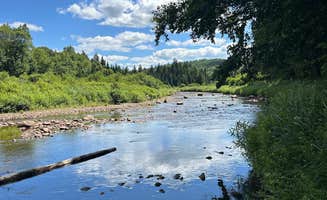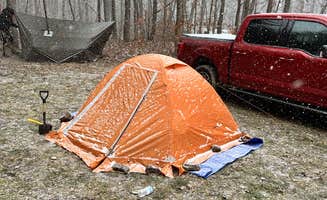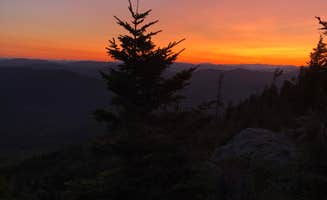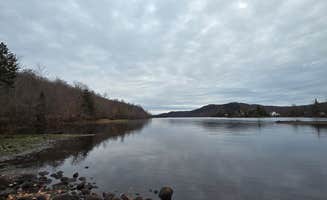Dispersed camping near Gloversville, New York offers primitive overnight options in the southern Adirondack foothills. The region features elevations ranging from 800 to 2,000 feet with mixed hardwood forests and numerous small streams. Weather conditions vary dramatically by season, with summer highs averaging 75-85°F and winter temperatures frequently dropping below freezing, requiring appropriate seasonal gear for overnight stays.
What to do
Fishing opportunities: The Mohawk River at Fort Plain Lock 15 on Empire Trail provides river access for anglers with valid licenses. "It's a great spot for wildlife viewing and fishing (with a valid license)," notes camper Mona M. Water levels fluctuate seasonally, affecting fishing conditions.
Winter exploration: Snow conditions allow for seasonal activities at numerous sites near Gloversville. At Burnt Rossman State Forest - Westkill Camp, winter visitors appreciate the accessibility despite snow coverage. "Was a great location for winter camping. Site easily accessible from road," reports camper Felix R., highlighting the year-round camping potential.
Biking access: State forests often feature multi-use trails suitable for mountain biking. At Ushers Road State Forest, campers can access bicycle-friendly trails from the main trailhead. "This trailhead provides access to bicycle-friendly nature trails. I explored both directions on my bike, riding approximately half a mile down each side," shares one reviewer, noting terrain changes after recent rainfall.
What campers like
Stream access: Many primitive camping sites near Gloversville feature water access. At Cod Pond Dispersed Pull-Off, campers appreciate the natural soundtrack. "There is a river down the hill from the campsite which helps keep it fairly cool at night," writes Taylor A. Another camper notes, "There was a fire ring and access to the river down a semi-steep bank. Beautiful to listen to at night."
Minimal crowds: The remote nature of dispersed sites means limited encounters with other campers. "Love to camp here all year long have been coming to the area for a couple of decades now. Remote. Sometimes you never see anyone," writes Robert B. about the camping experience at Betty Brook Camp.
Wildlife observation: Multiple sites provide opportunities for spotting local wildlife. One camper at Fort Plain Lock 15 mentions, "The resident peacock has been keeping me company." Water-adjacent sites typically offer better wildlife viewing chances, particularly at dawn and dusk.
What you should know
Road conditions: Access roads to primitive camping sites often require careful navigation and appropriate vehicles. At Duck Pond Campsite, a camper cautions about road quality: "The road in on old cemetery rd was pretty rough, so we decided to go out the other way, which was way worse." Another camper advises, "Just be careful driving in the sometimes rough conditions."
Carrier-specific cell coverage: Mobile service varies significantly by provider across the region. At Powley Road in Ferris Wild Forest, one camper reports, "There is zero Verizon cell service in the whole area. So plan accordingly." Other sites may have spotty coverage with specific carriers working better than others.
Site numbering systems: Some areas use designated site numbers to organize dispersed camping. "Had a quiet and peaceful stay. Must camp at a numbered site," explains Meghan B. about Powley Road camping. At Cod Pond Pull-Off, a camper notes, "This site is campsite 6 and very private (I believe there must be others located close by)."
Tips for camping with families
Surface comfort: Ground conditions at primitive sites can impact sleep quality. "Ground may look flat but when sleeping-definitely is not," warns one camper at Cod Pond Pull-Off. Families should bring extra padding or sleep systems designed for uneven terrain.
Bug preparation: Insect activity varies by season but can be intense in summer months. "The bugs were terrible," reports one camper at Cod Pond. Families should pack appropriate repellent, protective clothing, and consider screen shelters for meal times.
Water sources: While streams run through many campsites, potable water availability varies. At Fort Plain Lock 15, one camper notes, "At the lock parking area, you'll find pit toilets, a dumpster, and potable water available on the side of the building as you enter." Most primitive sites require bringing your own water or filtration systems.
Tips from RVers
Size restrictions: Most dispersed camping areas near Gloversville accommodate small to medium vehicles only. At Betty Brook Camp, a local advises, "I would not recommend this for large trailers. The site is fairly small." Small travel trailers and vans generally access sites more successfully than larger RVs.
Turnaround limitations: Many primitive sites lack sufficient space to turn larger vehicles. At Cod Pond Pull-Off, a camper reports, "Site was big enough to pull our mid-size SUV down and unfold rooftop-tent, but we did have to back out in the morning; not enough room to turn around." RVers should scout sites before fully committing to avoid difficult extraction situations.





